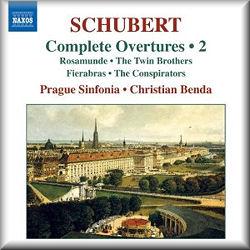|

Support
us financially by purchasing this disc from |
|
|
|
|
|
|
Franz SCHUBERT (1797-1828)
Complete Overtures: 2
Overture in D major, D 556 (1817) [6:46]
Overture in the Italian Style in D major, D 590 (1817) [7:54]
Overture in the Italian Style in C major, D 591 (1817) [7:27]
Rosamunde: Overture (from Die Zauberharfe), D 644
(1820) [10:23]
Die Zwillingsbrüder, D. 647: Overture (1819) [4:01]
Overture in E minor, D 648 (1819) [6:11]
Rosamunde: Overture (from Alfonso und Estrella), D
732 (1822) [5:50]
Die Verschworenen -- Der häusliche Krieg, D 787 (1823) [7:03]
Fierrabras, D 796 (1823) [8:53]
Prague Sinfonia/Christian Benda
rec. Arco Diva-Domovina, Prague, November 2006
NAXOS 8.570329 [64:28]
See also review by John
Sheppard
Schubert's overtures, as concert pieces, have never achieved
the profile or popularity of his songs and some of his symphonies.
Those composed for operas sank like stones along with those operas,
remaining obscure for decades. Generic, plain-Jane billing didn't
help some of the others: "Overture in D" is hardly a title
calculated to quicken the blood. In any case, the overtures don't
have the same traction, either on the platform or on disc, as those
by Mendelssohn or Weber. The only one most listeners know is Rosamunde
- and that can refer to either of two!
In fact, it's those opera overtures that make the most positive
impression here. Alfonso und Estrella - originally composed
for Rosamunde - and Fierrabras, with their imposing
introductory tuttis and bracing rhythmic edge in the fast
passages, are heirs to Mozart's style of symphonic drama. The
chipper, agreeable Die Verschworenen offers a nice contrast.
The overture to Die Zwillingsbrüder, a remarkably concise
piece of writing, generates drama and mystery from harmonic instability,
with the music constantly veering into the minor.
This performance of the Zauberharfe Overture - the one most
people call "the" Rosamunde overture - doesn't
immediately settle in: the slow introduction is pleasant, but somehow
slightly adrift. The strings' feathery attack on the main Allegro
is fetching, and the tuttis are joyous. Structurally similar
to this are the Overtures in D and in E, which offer a wealth of attractive
melody, though the E minor's sprightly second theme, initially
charming, devolves into mere harmonic note-spinning in the development.
The two overtures "in the Italian style" are supposedly
homages to Rossini, which may not be immediately obvious. Themes and
whole paragraphs of the D major later found their way, with some variation,
into Die Zauberharfe, though the annotator seems unaware
of this; the bustling main section, with its incisive tuttis,
most readily reflects the Rossini style. The C major overture effectively
draws on both German and Italian influences. The slow, lyrical introduction
is pure Schubert, but the perky faster section is very Rossinian,
even taking in a couple of brief "Rossini crescendos" beginning
at 5:30.
The Prague Sinfonia is an expanded successor to the old conductorless
Prague Chamber Orchestra, with the presence of Christian Benda as
director allowing for more strongly profiled performances. Schubert's
scoring is often heavier than you might expect, and Benda knows how
to keep the textures clear and springy without losing the needed sense
of weight. The playing is lyrical and driving as needed, and the ensemble
sound mostly compact and focused; only occasionally, as in the slow,
solemn passage at 5:34 of the D major Overture, does the sonority
become oozy and less sure.
I've not heard the previous issue in the Naxos series (review),
but I won't hesitate in recommending this handy collection,
especially as most of this music has not been readily available. Yehudi
Menuhin recorded four overtures (EMI Doublefforte 7243 5 73362 2)
along with his Schubert symphony cycle, but Benda's taut, characterful
accounts outclass Menuhin's stodgy Alfonso und Estrella
and his tentative control in the others. EMI's "simpler"
production has its aural appeal, but Naxos's warm, vivid sound
is excellent.
Stephen Francis Vasta
Stephen Francis Vasta is a New York-based conductor, coach, and
journalist.
|



 All Nimbus reviews
All Nimbus reviews








